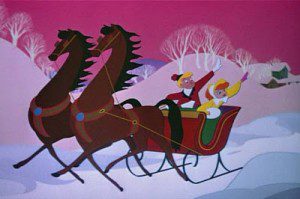 Melody Time shows Walt at the bottom of the animation barrel. He had turned his attention toward experiments in educational films, live action, and was coming back to the insane idea of a theme park, Disneyland, and the missing genius shows for the first time. Melody Time actually has two delightful sequences I saw as a child: Johnny Appleseed and the story of Pecos Bill. On the other hand, the first sequence is scarcely animated and reminds one of the nadir of television animation to come.
Melody Time shows Walt at the bottom of the animation barrel. He had turned his attention toward experiments in educational films, live action, and was coming back to the insane idea of a theme park, Disneyland, and the missing genius shows for the first time. Melody Time actually has two delightful sequences I saw as a child: Johnny Appleseed and the story of Pecos Bill. On the other hand, the first sequence is scarcely animated and reminds one of the nadir of television animation to come.
Walt never stooped to Cinderella II, but Melody Time betrays the studio to troubles to come. For the first time, Walt and his studio had given up creating or leading culture and were retreating to the juvenile. Nostalgia always played a part in Disney films, but now it was becoming a dominant theme. Walt hired stars who were safer figures like the Cowboy star Roy Rodgers. Just as the academic establishment was shifting to the left, Disney was becoming less confident about the liberal experiment. He was not a reactionary, but had the sense to see the optimistic United Nations “values” were being eroded. The liberalism of the Marxists was contrary to the liberalism he embraced. Walt Disney was not a hater and so his films began to turn inward. If Walt could not mold reality, he could create a better reality. Disneyland would be the culmination of that dream. Meanwhile, given limited resources and time, the art of the animation suffered.
Johnny Appleseed is presented as an American saint in a hagiography worthy of any church writer. Pecos Bill is given Arthurian tragedy where the happiness of the exceptional hero is betrayed by the loss of the beloved Slue-foot Sue. Donald and José escape the tedium into a cocktail induced party where for the only time in human history, a Wurlitzer organ and the player was an object of desire. The animation remains trippy, but the concepts are tired. Fantasia was a concert for future leaders featuring the best Walt could give us. Make Mine Music was a delightful pops concert, but Melody Time feels a bit like the reunion tour of an aging band at a county fair. You can enjoy it, but it is all a bit sad.

The company being built around Walt should have taken warning and Walt himself should have noticed a weakness: without his attention, mediocrity was the result. You cannot replace genius with an accumulation of mediocrity: one Alexander the Great is worth an entire army. Ten people with an IQ of 100 are not smarter than one genius with an IQ of 200 and a knack for creation. Walt Disney was the company and when he was inattentive, stagnation resulted. It is popular in some circles to point out Walt was no great artist himself (he knew this) and that though he could tell a story, he did not write them. What was Walt?
Walt Disney took the genius of writers, artists, and idea people and got them to work together on projects greater than those they could envision or create themselves. He was the organizer of dreams and the one man who wanted excellence even when he knew he could not get it. Walt got too much credit and too little. When I was a child, I assumed he did almost everything on the films, when he did (in one sense) almost nothing. Yet I was right in a greater sense: Walt Disney was the commander and without him there would have been no company.
They knew it when he was gone and what they did not know is that they had only twenty years of Walt Disney left.
Apple made the mistake of letting Steve Jobs go and hiring more efficient managers, but Apple did not exist again until Jobs returned. The Progressive Party died when Teddy Roosevelt took it to staggering heights and then left. Disney scarcely survived Walt and only did so because Vault Disney made them tough to kill. This film should have warned Walt and his company that he was too necessary to excellence . . . but then the hacking cough he was developing should have warned him of mortality too.
We often know a leader best when he has left the building.











